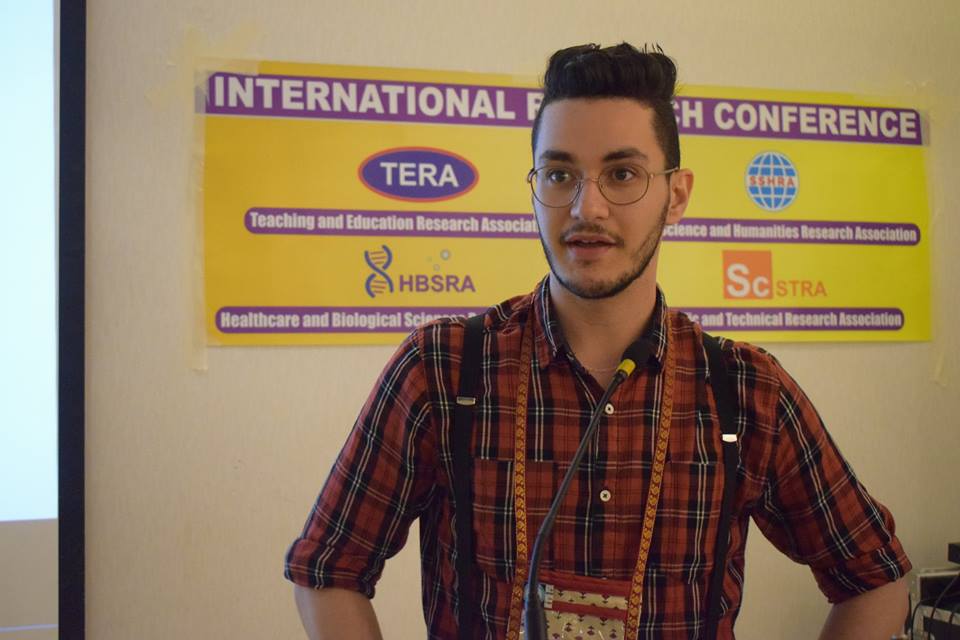 Riadh Ghemmour is an Indigenous Kabyle doctoral researcher in education based at the Graduate School of Education. He is interested in decolonising research methodologies and methods in education research. He is the co-founder and co-editor at Decolonial Dialogues, and a Student Fellow at the ‘Decolonial Knowledge Production and Anti-Racist Pedagogy’ Education Incubator Funded Project, led by Exeter Decolonising Group.
Riadh Ghemmour is an Indigenous Kabyle doctoral researcher in education based at the Graduate School of Education. He is interested in decolonising research methodologies and methods in education research. He is the co-founder and co-editor at Decolonial Dialogues, and a Student Fellow at the ‘Decolonial Knowledge Production and Anti-Racist Pedagogy’ Education Incubator Funded Project, led by Exeter Decolonising Group.
I love research. I think research changes us as humans including our social conditions, but are [we] doing it right? I started my MSc in education research in 2017 at the Graduate School of Education (University of Exeter) leading to a PhD route after completion. I vividly remember the research inputs and knowledge which I received regarding the different research paradigms, methodologies and methods. Coming from ‘Global South’ with my Indigenous Kabyle identity, I have not been critical enough to appraise the knowledge which I was introduced to because I though these were the ‘games’ of research which are ‘universal’ across all contexts.
In 2018, I started my PhD journey, I was still navigating the complexity of the thesis (until now!) and reading the different literature on my topic and research methods. I came across this unfamiliar and strange concept, ‘decolonisation!’ I had no clue what it was, what it does, and why it was mentioned in research-related papers. Of course, I was curious and intrigued to read more – the more I read, the more I felt connected as if the concept was conversing with my existence and intersectionality. Indigenous Māori Linda Tuhiwai Smith was the first decolonialist scholar I have read and I remember her poignant statement, ‘research is probably one of the dirtiest words in the Indigenous world’s vocabulary’ which will stuck with me throughout my entire research and teaching career. So at this very particular moment, my critical consciousness was activated to critique, challenge and appraise my taken-for-granted assumptions and ideologies which I constructed around research praxis. This led me to conclude that the contents which I was introduced to either during the MSc programme or back home (in Algeria where I did my BA and MA) are driven from essentialist Eurocentric perspectives. Of course, my aim is not to disregard what has been constructed in the West, but I question why other ways of doing research are not taught nor explored in the academy.
My self-teaching process allowed me to discover decolonising, Indigenous, and tribal methodologies which I never heard of before. From that moment, I decided to pursue my scholarship towards understanding decolonisation process to celebrate different worldviews grounded in an ethical moral responsibility to achieve social justice and equity within and beyond HE. At the early stages of my PhD, I struggled to find fellow peers to talk ‘decolonisation’, but luckily I heard of Exeter Decolonising Group and the Education Incubator project, ‘decolonial knowledge production and anti-racist pedagogy’ composed of a group of activists from different departments and disciplines. I decided to apply in order to get involved to foster solidarity, share good practice and progressive knowledge to challenge ‘mainstream’ ideologies within the academy and include other ways of knowing and being in order to make our site of learning and teaching a ‘safe’ space for all diverse communities. In fact, being involved allowed me to explore other facets of decolonisation outside my educational lens to have a pluriversal mind which is critical, reflective and versatile; and this will definitely have implications on the way I teach, research and co-exist within a community in the present and future. Indeed, being involved boosted me to commence a small project towards decolonising research methods curriculum to inform future practice and provision at GSE.
Clearly, Education Incubator projects provide excellent opportunities and a supportive ethos for UG, PG, and PGR students to be an integral part of the world and contribute to shape the trajectory of the University of Exeter. So, I really do encourage students to get involved – if they can- to expand the possible, leave a legacy behind them and see the world from different colours to become pluriversal minds.
Written by: Riadh Ghemmour
